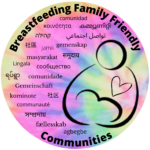1) Breastfeeding as Disease Prevention Infrastructure
A new Lancet Global Health modeling study (Nov 2025) estimates that if exclusive breastfeeding reached 90% in 132 low- and middle-income countries, we’d see fewer deaths from non-communicable diseases (like heart disease and stroke) and millions fewer cases of type 2 diabetes and hypertension across moms and their children over time. The takeaway is simple: breastfeeding support today = chronic-disease prevention tomorrow.
What this means for BFFC
Our Ten Steps to a Breastfeeding Family Friendly Community already target the levers that move exclusive breastfeeding: maternity protection, clinical quality, workplace time/space, community counseling, and Code protection. This study adds a powerful frame. These same steps are also non-communicable diseases prevention infrastructure. When local leaders invest in the Ten Steps, they aren’t just improving infant health; they’re strengthening long-term heart and metabolic health for whole communities.
Do this next
- Share the study with your mayor/commissioners and hospital partners.
- Invite employers to adopt/upgrade lactation spaces and protected time.Encourage everyone in our community to simply welcome lactating parents
We celebrate every family on their infant feeding journey. We welcome every drop of human milk and recognize that exclusive breastfeeding is a community challenge that is still out of reach for many. That’s why we’re changing systems so families receive the support they need to meet their own infant feeding goals.
2) Breastfeed Durham: Local Steps, Lifelong Health
A new Lancet Global Health study suggests that scaling up exclusive breastfeeding can reduce future chronic disease in both mothers and children. That’s on top of the well-known benefits for infant survival and development.
Why this matters in Durham
Everything we’re building together—Lactation Collaborative, Breastfeeding Welcome Here businesses, and community events helps families sustain exclusive breastfeeding in the first six months. This research shows those supports may also lower future risk of heart disease, stroke, diabetes, and high blood pressure in our community.
Do this next (Durham edition)
- Families: Reach out to our communities drop-in lactation support groups during the first 6 months.
- Clinics & hospitals: Add the “long-term health” message to prenatal and discharge education.
- Employers: Keep up the good work of welcoming breastfeeding patrons
We celebrate every family on their infant feeding journey. We welcome every drop of human milk and recognize that exclusive breastfeeding is a community challenge—still out of reach for many. That’s why we’re changing systems so families receive the support they need to meet their own infant feeding goals.
3) North Carolina Breastfeeding Coalition: Policy That Pays Off
New evidence, new leverage: The Lancet Global Health modeling shows that higher exclusive breastfeeding rates translate into fewer non-communicable diseases across generations. For North Carolina, that means breastfeeding policy isn’t just perinatal care. It’s chronic-disease prevention and smart spending.
NCBfC priorities this supports
- Workplace & leave: Advance policies that protect time and space for lactation and expand paid leave.
- Clinical & community financing: Strengthen Medicaid/payment pathways for lactation care and peer support; align Baby-Friendly investments with long-term NCD prevention goals.
- Marketing protections: Guard families from predatory formula marketing by promoting Code-aligned practices.
NCBfC champions policies that expand informed choice and practical support. We celebrate every family on their infant feeding journey. We welcome every drop of human milk and recognize that exclusive breastfeeding is a community challenge that is still out of reach for many. That’s why we’re changing systems so families receive the support they need to meet their own infant feeding goals.
